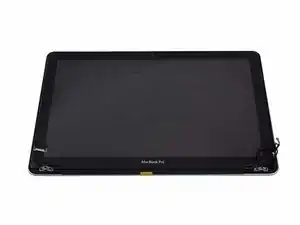
Fixing the MacBook "Floppy Screen" Loose Screen Issue
These are some common tools used to work on this device. You might not need every tool for every procedure.
The MacBook Pro laptop was first introduced in January 2006; it replaced the PowerBook G4, Apple's earlier professional line of laptops. The original MacBook Pro model came in an aluminum enclosure, a trend that continues with this line of laptops today.
After more than two years and numerous incremental upgrades, Apple announced a completely new MacBook Pro model in October 2008, dubbed the MacBook Pro 15" Unibody. The MacBook 15" Unibody is a distinct update of the original MacBook Pro, packing all the previous features of the Pro into a more stylish and lighter weight aluminum enclosure.
In late 2012 Apple introduced the thinner and lighter MacBook Pro with Retina Display, bringing crisp high-resolution screens, but vastly reduced serviceability—Retina models’ lifespan is artificially limited by things like glued-down batteries and soldered RAM. Later models took this trend further by soldering down the storage, making these “pro” machines effectively non-serviceable and non-upgradeable after purchase.
2016 brought the most radically different and polarizing generation of MacBook Pros yet, with all I/O ports replaced by a small number of USB-C (Thunderbolt) ports. The popular and practical MagSafe charging port was also eliminated. Function keys were replaced by the Touch Bar, a touch-sensitive OLED strip that dynamically displays various context-dependent controls. Apple also completely re-engineered the keyboard, replacing its conventional scissor switches with extremely low-travel “butterfly” switches, which allowed for a thinner device and more stable key presses—but the mechanism proved relatively fragile and unreliable even after several revisions to the hardware, and reactions to the “feel” of the low-travel keys were mixed even when they worked correctly. The problem was compounded by the lack of practical repair options; fixing the keyboard requires replacing the device’s entire top case assembly, including the battery and speakers. Apple eventually created a 4-year extended warranty program for the troubled keyboard.
The most often replaced MacBook Pro parts include the screen, logic board, keyboard, speaker, SSD, screws, SSD enclosure, battery, trackpad, case components, rubber feet, and cables.
Determining which model of the MacBook Pro you have can be a challenge. The same model numbers can have a variety of processor configurations. Even if you think you know exactly which MacBook you have, a quick trip through the laptop identification system can't hurt.